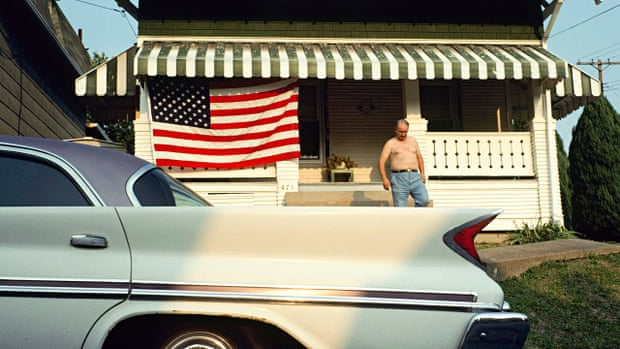
During the 2012 presidential election, Republican nominee Mitt Romney
regularly liked to joke that President Obama wanted the US economy to look "more
like Europe". In the context of modern American politics, few insults are more
stinging. To be European is to be somehow effeminate, irresolute and, perhaps
worst of all, socialist. It's the opposite of the "rugged individualism" and
"exceptional nature" of the uniquely American experiment in self-government.
But, as a sobering New York Times article last week made clear, America could
have a lot to learn by looking to Europe. According to the New York Times, the
American middle class – the linchpin of the country's phenomenal postwar
economic growth – can no longer call itself the richest in the world. "While the
wealthiest Americans are outpacing many of their global peers," says the NYT,
"across the lower- and middle-income tiers, citizens of other advanced countries
have received considerably larger raises over the last three decades." America's
poorest citizens lag behind their European counterparts; 35 years ago, the
opposite was true.
This was yet one more wake-up call about the reality of America's continuing
economic malaise. Ask Americans if the country is on the right track – 60% say
no. Satisfied with the way things are going in America – only 25% say yes. Still
think you're a member of the middle class – only 44% feel so confident. Forty
per cent self-identify as lower-class, a 15-point jump since 2008. Among young
people, the numbers are even more depressing. Those who place themselves in the
lowest tier have doubled in just the past six years.
While a majority of Americans tenaciously continue to hold dear to the
American Dream – that long-standing American ideal that if you work hard
anything is possible – more and more people are reporting that the opportunity
for social advancement feels increasingly out of reach for them and their
children. Indeed, it is hard to think of a more disquieting trend in American
society than the fact that those in their 20s and 30s are less likely to have a
high school diploma than those between the ages of 55 and 64.
All of this must seem counterintuitive to foreign audiences. The US swaggers
along on the world stage with a certainty and sense of moral purpose that no
other country can match. Blessed with practically limitless national resources,
a dynamic and diverse population, a relatively stable political system and
innovative technological capabilities that other nations can only dream of, how
can so many Americans be falling behind – and how can the nation's leaders allow
it to happen?
The answer is disconcertingly simple: we chose this path.
Granted, no one actively set out to attack the middle class in America. There
wasn't some evil plan hatched behind closed doors to wreak socio-economic havoc.
But the decline of the American middle class, the ostentatious wealth of the
so-called 1% and the crushing economic anxiety of the growing number of poor
Americans have happened in plain sight.
It is the direct result of a political system that has for more than four
decades abdicated its responsibilities – and tilted the economic scales toward
the most affluent and well-connected in American society. The idea that
government has an obligation to create jobs, grow the economy, construct a
social safety net or even put the interests of the most vulnerable in society
above the most successful has gone the way of transistor radios, fax machines
and VCRs. Today, America is paying the price for that indifference to this
slow-motion economic collapse.
It wasn't always like this.
Once, Americans lived in a country where it wasn't just the biggest boats
that floated high on a rising economic tide. In the years after the Second World
War, America was defined by an unprecedented period of economic prosperity. Jobs
were plentiful and well-paying, with generous health and retirement benefits.
New creature comforts, from refrigerators and washing machines to televisions
and cars, were suddenly available. Americans became homeowners and eventually,
if they were lucky, suburbanites. Perhaps most important, those at the bottom of
the economic ladder shared in the bounty as much as those at the top.
Life back then was never as idyllic as nostalgic portrayals of postwar
America would suggest (this was particularly true if you were a minority or a
woman). But it was also true that Americans enjoyed the type of economic
security that current generations can only dream of.
Part of the reason was that they had political leaders who recognised that
the federal government could not just sit on the sidelines. From the emergency
measures of the New Deal, which laid the foundation for the modern welfare
state, to the vast ambitions of the Great Society, the government provided
support for the aged, healthcare for the poor, job security for workers, good
schools for the nation's young people and invested in science and infrastructure
projects that created new economic opportunities. By the 70s, however, as the
postwar economic boom began to deflate, so, too, did the idea that government
had a role to play in stewarding the economy or protecting workers from the
vicissitudes of the free market. Instead, as a conservative anti-government
populism emerged out of the perceived "liberal" excesses of the 60s, a new
political ethos came to the fore. It was one promoted by Republicans (if
occasionally articulated and endorsed by Democrats). Government was no longer a
friend to the working man – it was a malignant force transferring his
hard-earned tax dollars to the poor and minorities.
These attitudes weren't necessarily new. Americans have long flirted with
strains of anti-centralism and fears of concentrated power. But out of this
backlash would come toxic policy ideas that have defined post-60s US politics –
lower taxes and even lower federal spending, less regulation and even less
government intervention in the economy. Though pitched to the American people as
a magic elixir for what ailed the US economy, they instead brought the economic
disquiet we are seeing fully flower today.
The impact of conservatism's anti-government backlash was significant.
Unemployment benefits became less generous; same with food stamps, welfare
payments and the minimum wage. Job protections were weakened as once strong
support for unions and organised labour was replaced by increasing hostility
from pro-business Republicans. When once a third of all private sector Americans
were in unions, today the number is down to around 11%.
College tuition fees went through the roof as support for public universities
declined. This was happening at the same time that a university degree became an
essential ticket for success in a competitive global economy. A lack of
early-childhood education and underperforming schools, particularly for the
poorest Americans, meant that unless you're in the top 10% of Americans chances
are that when your child begins kindergarten, he or she is already one step
behind.
This educational inequality is reflective of a larger trend of growing income
disparities across US society. So, as Americans saw their wages stagnate, their
economic anxieties increase, their debt levels skyrocket, their retirement
savings shrivel and their future prospects dim, the very rich got much, much
richer.
Yet, conservatism's most pernicious impact came not from what it
accomplished. There was no rolling back of the welfare state or the Great
Society. The revered conservative Republican saviour Ronald Reagan railed
against big government, but as president he found himself unable to zero out
even a single major spending programme.
Far worse, however, were the sins of omission. Conservatism's most dubious
legacy came in stopping progress dead in its tracks. There were no expanding
childcare benefits or universal pre-kindergarten to deal with the influx of
women in the workplace. Millions lacked health insurance coverage and yet
Congress showed little inclination toward providing universal access to
healthcare. New infrastructure programmes, such as high-speed rail or expanded
broadband penetration, went nowhere. Public works programmes to create jobs
weren't even on the table. When new social programmes were created, such as
family and medical leave, they were pale substitutes of what the European middle
class takes for granted.
Instead, Congress busied itself with more tax breaks and subsidies for the
richest 1% and hacked away at regulations that protected workers and the social
safety net that kept them from falling into economic misery. Until the long
overdue passage of Obamacare in 2010, the middle class consistently found itself
on the short end of the stick.
Certainly, some will quibble as to how much blame the federal government
should receive for this economic downturn. Larger systemic forces, such as
globalisation, technological change and the increasing specialisation of the US
economy, which demanded more educated workers, played important roles as well.
Still, even if one accepts that these factors were more responsible, where were
Congress and the president in helping workers navigate these changes?
Alas, they were probably out raising money from the 1% for the next election.
It's small wonder that, according to a recent academic report, the world of
politics is so "dominated by powerful business organisations and a small number
of affluent Americans" that the US is on shaky ground even calling itself a
democracy.
As Americans have seen their economic fortunes decline, those most in a
position to help them have shown far too little willingness to lend a hand, none
more so than conservative Republicans.
In the immortal words of Ralph Waldo Emerson, "conservatism makes no poetry,
breathes no prayer, has no invention". Its success comes in standing in the path
of reform and saying no. With the Republican party currently in charge of the
House of Representatives (and unlikely to lose that control in this autumn's
mid-term election) there is little reason, unfortunately, to believe that the
nearly four-decade decline in the financial standing of the American people will
right itself soon. In short, the "choice" that America made to pursue the path
of decline will be with us for some time to come.
Kind of makes looking to Europe seem like not such a bad idea.












